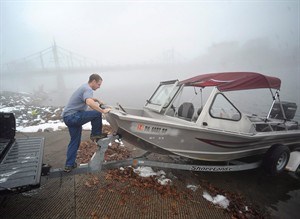
Scott Moser, of Palmer Township, Pa., puts his boat in the Delaware River from the boat launch in Phillipsburg, N.J. on Dec. 22, 2013. With prices soaring at the pump, old gas-guzzling cars are a rare sight on the roads these days. But the same isn't true of the country's waterways, where boat engines are passed down from one generation to the next, often lovingly coaxed into yet one more summer's active duty - for decades. THE CANADIAN PRESS/AP, The Express-Times, Matt Smith
May 21, 2014 - 9:57 AM
TORONTO - With prices soaring at the pump, old gas-guzzling cars are a rare sight on the roads these days.
But the same isn't true of the country's waterways, where boat engines are passed down from one generation to the next, often lovingly coaxed into yet one more summer's active duty — for decades.
But the apparent frugality — why buy a new motor when Uncle Harold's still works? — is actually a false savings, both from a human health and an environmental health point of view, say the organizers of a new campaign to get old boat motors off Canada's lakes and rivers.
The campaign — called Clean Wake — is targeting two-stroke boat motors, so named because of the simple up-and-down action of the piston in the engine.
These outboard motors are bad for water and people swimming in it and they give off emissions that are harmful to people riding in the boats they propel, explains Heather Farquharson, managing director of Summerhill Impact.
The organization, an environmental health not-for-profit group, is encouraging people to turn in their old two-stroke engines and replace them with more environmentally sound four-stroke motors.
The incentives are not just health related. The newer motors are substantially more fuel efficient — between 30 and 50 per cent more efficient, to be precise — and are estimated to be 90 per cent cleaner than two-stroke engines.
"At today's gas prices, it's quite something," says Farquharson, who suggests that boat operators will recoup the cost of their investment over time.
The newer motors are also quieter, a plus for both the boat operators and their neighbours.
Mike Driedger, program director with Summerhill Impact, says emission regulations introduced in the United States in 1996 essentially banned the production of two-stroke motors from 1997 onward, though stock made before the ban came into effect was not covered by it.
Not certain when your boat engine was made? "The best way for people to tell if they have an old conventional two-stroke is if they mix oil and gas together. Recreational boaters only do this for conventional two-stroke engines," Driedger says.
A major problem with two-stroke engines is that about 30 per cent of the fuel that passes through the motor's combustion chamber does not burn. It flows through the engine and into the water.
As well, the engines emit smog-forming particles "in quite intense amounts, even for short periods of time," says Farquharson.
"In a heat wave in July, the smog emitting from that engine is made worse because of the heat," she explains.
You don't see a yellow layer of smog hanging over a lake in the way you would over a city on a hot summer's day. But that doesn't mean the components of smog aren't being generated by old boat motors. And people in the boats or nearby are breathing in those emissions, Farquharson says.
"It's quite proximate from a human health perspective to those that are in the boat — especially if you've got children in the boat," she notes.
"And that exacerbates respiratory issues in all people, but especially people with asthma and all kinds of breathing difficulties."
Two-stroke engines also produce more carbon monoxide than four-stroke motors, Driedger says. There have actually been carbon monoxide poisonings — including the occasional fatal case — reported in relation to the operation of motor boats.
Currently Clean Wake is only officially operating in Ontario, where people who turn in two-stroke engines to designated locations will be offered a 10 per cent discount off a new four-stroke engine sold by Honda Marine, a partner in the program.
Environment Canada has provided financial support for the program.
The old motors will be drained and crushed.
Farquharson says Summerhill Impact hopes to run Clean Wake in other provinces in future. But in the meantime, people who want to get rid of their two-stroke engines can turn them in to a recycler. Automotive Recyclers of Canada can help you locate one, she says.
———
Online:
The Clean Wake program: http://www.cleanwake.ca/
Automotive Recyclers of Canada: http://autorecyclers.ca/members/
News from © The Canadian Press, 2014